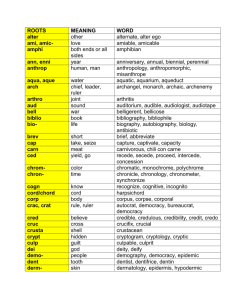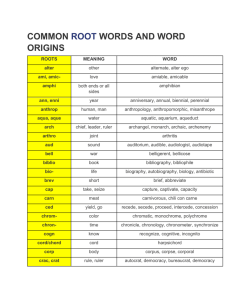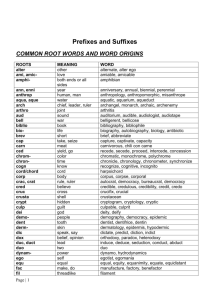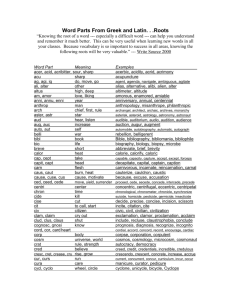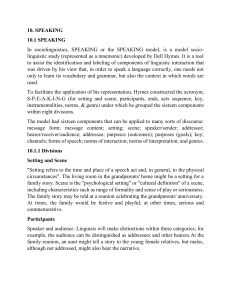Add to collection(s)
Add to saved
- No category
advertisement
advertisement
Is the category for this document correct?
Thank you for your participation!
Related documents
ROOTS MEANING WORD alter other alternate, alter ego ami, amic
Prefix, Suffix, Roots Dictionary
Simple teaching Roots, Prefixes and Suffixes
Word Parts From Greek and Latin. . .Roots
World History Vocabulary 10.1
Human Communication Processes -Sociolinguistics
Download
advertisement
Study collections
- 词根词缀
- root
Add this document to collection(s)
You can add this document to your study collection(s)
Sign in
Available only to authorized users
Title
Description
(optional)
Visible to
Everyone
Just me
Add this document to saved
You can add this document to your saved list
Sign in
Available only to authorized users
In English grammar, a root is a word or portion of a word from which other words grow, usually through the addition of prefixes and suffixes. By learning root words, you can decipher unfamiliar words, expand your vocabulary, and become a better English speaker.
The Roots of Words
Most words in the English language are based on words from ancient Greek and Latin. The root of the word «vocabulary,» for example, is voc, a Latin root meaning «word» or «name.» This root also appears in such words as «advocacy,» «convocation,» «evocative,» «vocal,» and «vowel.» By dissecting words such as these, etymologists can study how a word has evolved over time and tell us about the cultures they came from.
In some cases, root words might be slightly transformed en route to becoming part of words that we’re familiar with. In the above example, «vowel» is a word that’s clearly related to the voc root and its family of derivative words, and yet the «c» in «voc» is not present. There are several reasons for this sort of pattern, and the changes often depend on what language each individual word comes from, but it serves as a reminder that not every word with the same root will look exactly the same.
Root words are also useful for creating new words, especially in technology and medicine, where new innovations occur frequently. Think of the Greek root word tele, which means «far,» and inventions that traverse long distances, such as the telegraph, telephone, and television. The word «technology» itself is a combination of two other Greek root words, techne, meaning «skill» or «art,» and logos, or «study.»
Because several modern languages share some of the same ancestor languages, it’s not entirely uncommon for several related languages to share root words. For instance, the Latin root voc, described above, is shared by several Romance languages. Connections between languages can be found in the shared roots between them, although one always has to be wary of false cognates — that is, words that sound like they have the same roots (and thus related meanings) but actually don’t.
Greek Root Words
The table below defines and illustrates 25 of the most common Greek roots.
| Root | Meaning | Examples |
| anti | against | antibacterial, antidote, antithesis |
| ast(er) | star | asteroid, astronomy, astronaut |
| auto | self | automatic, automate, autobiograph |
| biblio | book | bibliography, bibliophile |
| bio | life | biography, biology, biodegradable |
| chrome | color | monochromatic, phytochrome |
| chrono | time | chronic, synchronize, chronicle |
| dyna | power | dynasty, dynamic, dynamite |
| geo | earth | geography, geology, geometry |
| gno | to know | agnostic, acknowledge |
| graph | write | autograph, graphic, demographic |
| hydr | water | dehydrate, hydrant, hydropower |
| kinesis | movement | kinetic, photokinesis |
| log | thought | logic, apologize, analogy |
| logos | word, study | astrology, biology, theologian |
| narc | sleep | narcotic, narcolepsy |
| path | feel | empathy, pathetic, apathy |
| phil | love | philosophy, bibliophile, philanthropy |
| phon | sound | microphone, phonograph, telephone |
| photo | light | photograph, photocopy, photon |
| schem | plan | scheme, schematic |
| syn | together, with | synthetic, photosynthesis |
| tele | far | telescope, telepathy, television |
| tropos | turning | heliotrope, tropical |
Latin Root Words
The table below defines and illustrates 25 of the most common Latin roots.
| Root | Meaning | Examples |
| ab | to move away | abstract, abstain, aversion |
| acer, acri | bitter | acrid, acrimony, exacerbate |
| aqu | water | aquarium, aquatic, aqualung |
| audi | hear | audible, audience, auditorium |
| bene | good | benefit, benign, benefactor |
| brev | short | abbreviate, brief |
| circ | round | circus, circulate |
| dict | say | dictate, edict, dictionary |
| doc | teach | document, docile, doctrinal |
| duc | lead, make | deduce, produce, educate |
| fund | bottom | founder, foundation, funding |
| gen | to birth | gene, generate, generous |
| hab | to have | ability, exhibit, inhabit |
| jur | law | jury, justice, justify |
| lev | to lift | levitate, elevate, leverage |
| luc, lum | light | lucid, illuminate, translucent |
| manu | hand | manual, manicure, manipulate |
| mis, mit | send | missile, transmit, permit |
| omni | all | omnivorous, omnipotent, omniscent |
| pac | peace | pacify, pacific, pacifist |
| port | carry | export, import, important |
| quit | silent, restive | tranquil, requiem, acquit |
| scrib, script | to write | script, proscribe, describe |
| sens | to feel | sensitive, sentient, resent |
| terr | earth | terrain, territory, extraterrestrial |
| tim | to fear | timid, timorous |
| vac | empty | vacuum, vacate, evacuate |
| vid, vis | to see | video, vivid, invisible |
Understanding the meanings of the common word roots can help us deduce the meanings of new words that we encounter. But be careful: root words can have more than one meaning as well as various shades of meaning. In addition, words that look similar may derive from different roots.
In addition, a handful of root words can stand on their own as whole words in and of themselves. This list includes words such as photo, kinesis, chrome, port, and script. Words like this tend to have related meanings on their own, then can also act as roots for longer, more complex words.
Sources
- Bryant, Alice, and Robbins, Jill. «Grow Your Vocabulary by Learning Root Words.» VOANews.com, 28 November 2017.
- Grammarly staff. «Why You Should Learn Roots.» Grammarly.com, 6 February 2016.
- McCammon, Ellen. «50 GRE Words You Should Know.» PrepScholar.com, 8 February 2017.
Etymology is that part of linguistics that studies word origins. By determining the origins of the morphemes that comprise English words, one is better able to determine and remember the dictionary definitions of words.
Let’s take a look at two English words, one that derives from Latin, and one from Greek, the two languages that gave English most of its vocabulary. The word incontrovertible, for instance, has the following Latin-based morphemes in it:
1. the prefix in- comes from the Latin word in, which in this case means “not.”
2. the prefix contro- comes from the Latin word contra, “against.”
3. the root or stem vert comes from the Latin verb verto, “turn.”
4. the suffix -ible comes from the Latin adjective habilis, meaning “handy” or “capable of.”
Hence, knowing the etymology or word origin of these four root words can give you insight into incontrovertible, which would etymologically mean “not capable of being turned against.” Since the dictionary definition of incontrovertible means “beyond dispute” or “unquestionable,” it is indeed “not capable of being turned against.”
Now let’s take a look at the word metamorphosis, which has its origin in three Greek words:
1. the prefix meta- comes from a Greek word meaning “beyond” or “change.”
2. the root morph comes from a Greek word meaning “shape.”
3. the suffix -osis comes from Greek as well, and means “state or process.”
So, the English word metamorphosis would etymologically have something to do with the “process of changing shape.” We can easily see how the definition of the word “metamorphosis,” which means “change in appearance, character, or shape” is derived from this.
By knowing a word’s etymology or word origin, one can more easily remember its dictionary definition.
Becoming Interested in the Origin of Words
Words, like facts, are difficult to remember out of context. Remembering is greatly
facilitated when you have a body of information with which to associate either a word
or a fact. For words, interesting origins or histories will help provide a context.
For example, a hippopotamus is a «river horse,» from the Greek hippos, meaning «horse,» and potamos, meaning «river.»
Indiana is called the Hoosier state, and its people Hoosiers. Why? In the early days, the pioneers were gruff in manner; when someone knocked
at the front door, a pioneer’s voice would often boom, «Who’s yere?»
If you were offered a Hobson’s choice, would you know what was meant? Thomas Hobson owned a livery stable in seventeenth-century
England. He loved his horses, and to prevent any one horse from being overworked,
he hired them out in turn, beginning with stall number one. Customers had to take
the horses they were given. Thus Hobson’s choice means no choice at all. (Pauk, p. 314)
Etymology is the study of the origins of words. The English language is living and growing.
Although many of our words have been part of our language for many years, new words
are added all the time. Following are various ways our language is influenced.
-
Derived from Foreign Words — English, in many cases, has been commonly expanded by incorporating foreign words
into it. Most of our language has ancient Anglo-Saxon or Latin origins. Other languages
have also added to our vocabularies. -
Additions through Technology & Products — Our words often reflect current interests, trends, and innovations. One of the
most recent contributors to our language has been computer technology, which has created
words such as bytes, monitor, and disk.Another way new words come into our language is through the development of products.
Some examples include: Kleenex, Walkman, Scotch tape, Xerox, and Linoleum. -
People’s Names — sometimes when a person invents or introduces something, that thing becomes associated
with the person’s name. The person, through time, is forgotten while the name lives
on in our language. Examples include:- mesmerize — F.A. Mesmer, an Austrian doctor and hypnotist.
- sideburns — an American English alteration of burnsides, Ambrose E. Burnside, a Union general.
-
Words from Letters — The initials for the names of things may actually come to replace the names. The
initials become the words that represent the thing, concept, or group. The following
are examples of words that have developed from initials.- TV — TeleVision
- DWI — Driving While Intoxicated
- COD — Cash On Delivery
- ZIP — Zone Improvement Plan
-
Word Histories — Some words also have interesting histories. Learning the stories behind the meanings
is a good way to learn those words. The following examples will give you an idea
of how history can affect language.- footman — It was once thought to bring bad luck if a person stepped on the door threshold
when entering a house. Rich people hired a servant to stand at their doors. His
job was to guard against a guest’s stepping on the threshold. The guard became known
as a footman. - hooker — A synonym for prostitute. The term became popular during the Civil War. The women
involved were camp followers. General «Fighting Joe» Hooker approved their presence
in order to boost the morale of his men.
- footman — It was once thought to bring bad luck if a person stepped on the door threshold
Presentation on theme: «Word Roots & Origins.»— Presentation transcript:
1
Word Roots & Origins
2
Do Now Purpose Brainstorm… where do many words originate or come from?
If you know what certain parts of words mean, you can figure out almost any word! This is how doctors and scientists around the word communicate So, if you are stuck on a test and do not know what a word means… break it down into its parts
3
Word Roots Parts of words — Prefix — Root — Suffix — Hydrophobic
Come from Greek and Latin Comes before the root word Often the beginning of the word if no prefix Added on the end of a word Hydrophobic Hydro / phobic Water / Fear of Fear of water
4
Example: DERMATOLOGIST
Breakdown — ____________ _______________ Meaning — Example: Subdermal Breakdown — ____________ _______________ Meaning —
5
You can make words using the same root word
You can make words using the same root word. You just need to change the prefix(beginning) or suffix(ending) Prefix Root Suffix Meaning 1 derm -otology 2 -otologist 3 Hypo -ic 4 -atitis SKIPPP Now lets test your skills…
6
DERMATOFIBROSARCOMA CARCINOSARCOMA SALIVOLITHITIS
7
Homework Practice Dermatitis Herbivore Cytology
8
Word Roots Homework The Language of Science Complete for H.W. using the SAME format as in class!
What Word origins means and why bother about it?
English Language is made of borrowings from about 150 languages…...it was first brought to the land by Germanic tribes- Anglo, Saxons and Jutes. This why we have so many English words with Greek and Latin roots as prefix, suffix and many Scientific English words are derived from Latin and Greek.
The land was further taken over by French for about 100 years after the conquest of Normandy.there are a whole lot of words in English which are borrowed from e.g. Latin, French, Italian, Asia and Middle East in English Language.
In this period Norman French equated English language to the low worker to establish superiority of French language. Result being Church have records written in French!!!
Modern English era started with renaissance from 1500 to the present time.
Half the words we use today have roots in old English, yet old English looks so different from the present version.
———————————————————————————————————
History of English Word Origin
English word origins in English language date as far as back as 5th Century or as some say old English spoken by Celts. Celts were the earliest dwellers of the British Isle and only few of Celtic or old English words have survived into Modern English today, words like Water and Be.
Some Latin words have remained unchanged in English language but, most have changed the way they were used in old English to the way the are used today…….See here how Latin and Greek words they were used in old English period to modern English time. Also check out these Latin words used in their original form…Latin Words and Latin Roots.
Shakespeare alone invented 2000 unique words and catch phrase we still use
Why bother about word origins?
For the simple reason that large number of English words, around 80%, are borrowed from other countries and culture that came in contact with Britain.
Secondly, most words in Academic word List or vocabulary for advanced English have Greek and Latin roots as prefix, suffix used for numbers and for word formation.Therefore if you know the meaning of that word roots it will be easy for you to remember words for longer time.
Duc… to lead————— conduct, induce, produce, educate, deduct,
Mal………..Bad ————-Malnutrition/ Malpractice
Grat……. goodwill— grateful, gratuity, gratis
Nov……… New————Novelty, innovate, novice, novel, renovate
In late middle ages and in renaissance both languages were associated with learning and prestige. This why we see in science vocabulary Geek and Latin roots and Greek and Latin root words are present in a large number.
|
Foreign Borrowings in English Language belt, plant, street (Latin), Rugby, Window, Seat (Scandinavia), bacon, accuse, basin (French), Balcony, Carnival, Opera (Italian), Cannibal, Mosquito ( Spanish/ Portuguese), Horde, Trousers( Europe), Jungle, Bungalow, Thug, Juggernaut ( India), Bamboo, Ketch up ( Asia), Caravan, Kiosk ( Middle East), Taboo, Zero, Voodoo ( Around the world) |
More words with Latin word roots: Corp……..Body——- corpse, corpus, corps Culp……..fault— culpable, exculpate Oman….. ALL———— Omniscient, Omnipotent,Omnivorous Retro…….Back——- Retrospect, Retroactive Retrograde. Graph……. pictured——telegraph, autograph, polygraph Mania …….Madness—- agromania, anglo mania, nymphomania Cide…….. Kill—— pesticide, suicide, insecticide Tele……….Distance; Theo——God; |
English language has been influenced by the culture and linguistic patterns of the people who came in contact with it.
Many countries that invaded Britain or settled there left their prints on this language...
Brief Summary of Word origins in different time Periods
Germanic (Before ca. 450)
Borrowings from Latin; Everyday words Germanic tribes used for daily activites.
Prehistoric English (ca. 450-700)
More borrowings from Latin used in Christianisation process.
Old English (700-1100)
More literary borrowings from Latin; and words from Vikings
Middle English (1100-1500)
Borrowings from French especially from Government, Military and Sophisticated Cultural lexemes
Modern English (1500- present)
Scientific vocabulary based on words borrowing from Latin Greeks, and countries English came in contact with ——Europe, Asia, Australia, Africa, and the America
Return from Word Origins to English Vocabulary
Now FREE e-book ACADEMIC WORD LISTS AND HIGH FREQUENCY WORDLISTSRight-click to download the PDF.
FREE E-BOOK-Latin and Greek Word Roots
Now download
Right-click to download the PDF.
Oxford English Dictionary publishes new word updates and revised word meanings, on March, June,September and December every year. For instance, in March 2012, it added:
bit bucket n. An An imaginary trash location, example, «it fell into the bit bucket» means the data was lost.
Click here Contact me for mailing you daily updates on new words

By
Last updated:
April 2, 2023
How do you feel about shortcuts?
By learning short and simple pieces of English words, also known as word roots, you can unlock an understanding of thousands of words and boost your English vocabulary!
In this post, we’re going to share 30 English word roots from Latin and Greek to help you improve your comprehension of English by providing a shortcut to learning.
Contents
- What is a Root?
- 30 Common English Word Roots from Greek and Latin
-
- Roots of Greek Origin
- Roots of Latin Origin
- How to Use Roots to Form and Understand English Words
-
- The Top 10 Suffixes You’ll See with Roots
- The Top 10 Prefixes You’ll See with Roots
- The Matching Game for Practicing English Roots, Suffixes and Prefixes
Download:
This blog post is available as a convenient and portable PDF that you
can take anywhere.
Click here to get a copy. (Download)
What is a Root?
First, we should talk about what “root” means.
A root is the basic unit of a word.
Linguists, scientists who study language, refer to the root as the base or foundation of a word. If you really think about it, the name “root” makes sense. A real, literal root is the base of a tree, connecting the tree to the ground. The root of a word connects that word to some meaning.
To learn about other parts of words and their relationships with roots, check out this informative page.
30 Common English Word Roots from Greek and Latin
If you aren’t sure that you want to memorize hundreds of roots, then memorize just these 30 roots. These are some of the most useful and common roots that you’ll learn!
You’ll see these popping up everywhere in words you both know and don’t know. If you wouldn’t have had any idea what they meant before you had learned the roots, then you’ll see the value of learning roots.
Roots of Greek Origin
| Greek Root | Meaning | Example |
|---|---|---|
| Psych | Mind | Psychology (the study of the mind) |
| Phil | Love | Cinephile (movie lover) |
| Mega | Great, large | Megaphone (a large device which makes your voice louder) |
| Mono | Single | Monochromatic (having only one color) |
| Chron | Time | Chronological (organized by time of occurrence) |
| Bio | Life | Biology (the study of living things) |
| Theo | God | Theology (the study of religion) |
| Phone | Sound | Telephone (a device used to talk with other people) |
| Auto | Self | Automatic (happens on its own) |
| Poly | Many | Polyglot (person who can speak many languages) |
Roots of Latin Origin
| Latin Root | Meaning | Example |
|---|---|---|
| Struc | Build | Structure (parts or pieces built into something complex) |
| Vac | Empty | Vacuous (having an empty mind, not thinking) |
| Ver | True | Veritable (real, true, authentic) |
| Scrib/Scrip | Write | Prescription (a written note signed by a doctor which provides instructions for medicine or treatment) |
| Luc | Light | Lucid (bright, clear) |
| Mal | Bad | Malevolent (wanting to do bad or evil things) |
| Mar | Sea | Marina (a port or harbor for boats and ships) |
| Manu/Mani | Hand | Manicure (a treatment to make your hands look clean, neat and polished) |
| Min | Small | Miniscule (very small in size) |
| Fort | Strong | Fortitude (strength) |
| Mort | Death | Mortician (someone who prepares dead bodies to be buried) |
| Nas/Nat | Birth | Nascent (coming into existence, something just recently created) |
| Trans | Across | Transatlantic (something which crosses the Atlantic Ocean) |
| Voc/Vos | Voice | Vociferous (loud, someone who speaks loudly or talks a lot) |
| Aqua | Water | Aquarium (a tank of water where fish are kept as pets) |
| Bene | Good | Benevolent (wanting good things for people, generous, kind) |
| Omni | All | Omniscient (knowing everything) |
| Sens/Sent | Feel | Sentimental (emotional, attaching emotional value to things) |
| Terr | Earth | Terrarium (a container for land animals kept as pets, often containing rocks, dirt or sand) |
| Vid/Vis | See | Visible (able to be seen) |
How to Use Roots to Form and Understand English Words
Now that you have a list of great roots to memorize, you’ll need a list of the most common prefixes and suffixes to go with it.
Why?
Prefixes and suffixes are two things that can be attached to roots to form words.
Suffixes can be attached at the ends of roots to change either the definition or the part of speech (noun, verb, adjective, etc.) of the word. So, suffixes can change verbs into nouns, nouns into adjectives and so on.
To create words you put a root together with either a suffix or prefix. Examples:
photo (root for light) + graph (suffix for written) = photograph (light that is written)
re (prefix for again) + flect (root for bend) = reflect (to bend again)
Now you might think these are funny ways to define the words “photograph” and “reflect.” This is because using Latin to define words means that you’re using very direct, literal translations.
However funny these translations might sound, there’s always a clue there that shows what the true meaning is in English.
The Top 10 Suffixes You’ll See with Roots
Top Greek Suffixes
| Greek Suffix | Meaning |
|---|---|
| phil/phile | fear, fearing |
| chrome | color |
| logy | study of |
| ism | act, practice or result of |
| some | body |
| meter | a measurement |
| nomy | systematized knowledge of |
Top Latin Suffixes
| Latin Suffix | Meaning |
|---|---|
| able | is, can be |
| act | state, quality |
| cidal/cide | killer, a killing |
The Top 10 Prefixes You’ll See with Roots
Top Greek Prefixes
| Greek Prefix | Meaning |
|---|---|
| amphi | both, about, around |
| andro | man, male |
| anti | against, opposed |
| mono | one, single, alone |
Top Latin Prefixes
| Latin Prefix | Meaning |
|---|---|
| ad | to, attached to |
| semi | half |
| non | not |
| pre | before |
| inter | between |
| co | with, together |
As you can see, learning roots, suffixes and prefixes is a quick shortcut to learn and understand words in English.
Immersing yourself in the language and seeing how it’s used by native speakers is a great way to learn vocabulary and see word roots. There are many great TV shows in English that you could watch, or you could even try a language-learning program like FluentU.
FluentU features an array of bite-sized authentic English videos, like inspiring talks and movie trailers, each with interactive subtitles that you can hover over to see more information about the words used. The subtitles will help you identify new vocabulary that you can add to your personalized flashcard decks to practice.
By immersing yourself in native media, not only will you be able to expand your vocabulary by identifying roots and common trends, but you’ll also get to see them used in context!
The Matching Game for Practicing English Roots, Suffixes and Prefixes
As you know, practice makes perfect, and this also applies when learning roots, suffixes and prefixes.
Play this with a partner to see who can win the most points!
a. Make flashcards of the roots, suffixes and prefixes you want to memorize. You’ll also need a dictionary.
b. Mix up the flashcards into two groups, keeping suffixes and prefixes together in one group with the roots in another separate group.
c. Place the two groups in two separate piles face down in their separate groups. You’ll now have all the roots on the right side and prefixes/suffixes on the left side.
d. Pick a card from each group and turn both cards face up.
e. Form a word and write down what you think the definition should be according to the meaning of the root and the suffix or prefix you chose. Also write down whether you believe it is or isn’t a real word in the English language.
f. Once you’ve made your two guesses, look the word up in the dictionary to see if it really exists. If it does and the meaning you guessed is correct, then two points for you! If it’s not a real word, but you got the root and prefix/suffix meanings correct, then one point for you.
So there you have it, folks.
You’ve got a great guide to English word roots and how to use them!
Get out there and see how much English you understand now.
Download:
This blog post is available as a convenient and portable PDF that you
can take anywhere.
Click here to get a copy. (Download)
Word Origins: Etymologic Equivalents in English, Russian and Ukrainian
lufu → loue → luve → love
The above was the task related to the word origins and word history that I received some 20 years ago at a university exam in the history of the English language. The task was to explain how the word ‘love’ evolved from Old English ‘lufu’ to modern English ‘love’. Since then, my interest in etymology (the science of the origin and history of words) has not faded.
Words seem so much like people. Each has its own «biography», relatives (cognate words in the same and other languages), ancestors and descendants. There are dead words (words that are out of use) and newborn words (neologisms).
All phenomena in our fragile world are interconnected and interdependent, including our languages. You may think you know only one language. But your mother tongue has many words borrowed from or loaned to other languages. So, actually, you know many words from other languages even not knowing these languages per se.
See for yourself. Below is a table containing some Russian and Ukrainian words that have common Arabic, Teutonic, Latin or Greek roots with relevant English words. Now see if you can figure out the meanings of these Russian and Ukrainian words. For each word, there is a hint in English to make the task easier. Type your guess in the spaces under «Meaning». Then push the button «?» to see how accurate your guess is.
Hints:
1/ Branch of mathematics
2/ Financial establishment for keeping money and valuables safely
3/ Outer garment from neck to waist, worn by women and girls
4/ List of the days, weeks, and months of a particular year
5/ Bush with berries containing seeds which, when roasted and ground to powder, are used to make a drink by infusing with boiling water; the drink
6/ Person respected for bravery or noble qualities
7/ Magnificent and monumental tomb
Like this exercise? Continue to Word Origin, page 2.
Read more about the word origins and amusing evolution of these words: algebra, bank, blouse, calendar, coffee, hero, mausoleum.
1. Word origins: algebra; алгебра (Ru, Uk)
The word is derived from the Arabic language. ‘al-jabr’ were initial words of the title of a work written by Muhammad ibn Musa al-Khwarizmi, an Uzbeck mathematician and astronomer of the 9th century. Arabic ‘al-jabr’ means ‘restoration’ (‘restoration of the equation’s balance by adding or subtracting like elements to/from both sides of the equation’). In the Middle Ages, this word was borrowed from Arabic to Latin (Latin ‘algebra’) and from Latin it penetrated into other languages of the world.
English ‘algebra’ was borrowed from Arabic through Latin in 1551.
Russian ‘алгебра’ was borrowed at the beginning of the 18th century from Latin through German and Polish: German ‘Algebra’ → Polish ‘algiebra’ → Russian ‘алгебра’. In imitation of Polish, the Russian word ‘алгебра’ originally was pronounced with the stress falling on the second syllable. At the beginning of the 19th century, the stress moved to the first syllable.
Ukrainian ‘алгебра’ came to the language through the same channels as the Russian ‘алгебра’.
Additional info: As early as 4000 B.C., elements of algebra were used by ancient Babylonians famous for their high mathematical culture. Nevertheless, there were no individual mathematical sciences and the indivisible mathematics existed until the 9th century. Muhammad ibn Musa al-Khwarizmi was the first to separate algebra from arithmetic and geometry and started to treat it as a separate science. In Europe, the word ‘algebra’ was used for the first time only in the 16th century by Rafael Bombelli, an Italian mathematician. It can be explained by the fact that the Holy Inquisition repressed scientific thought in Europe, while sciences thrived in the East. Therefore, later on many scientific notions and terms, especially those related to mathematics, were borrowed by European languages from Arabic. In Russia, algebra as a science was introduced by Tsar Peter I at the beginning of the 18 century.
Back to Top of Word Origins Page
2. Word origins: bank; банк (Ru, Uk)
English ‘bank’ was borrowed from Italian (‘banca’, ‘banco’) through French (‘banque’). It meant «a money-changer’s desk» in both languages. Furthermore, this borrowing can be traced back to Teutonic ‘bankiz’ that meant «a rising ground, a bench». So, at the interlingual level, these equivalents semantically have evolved from the notion of «a rising ground, a bench» to «a money-changer’s desk» to «a bank».
Russian ‘банк’ is a borrowing from French or German.
Ukrainian ‘банк’, apparently, has the same etymology as the Russian ‘банк’.
Additional info: The first monetary transactions (cash settlements, currency exchange transactions, etc.) appeared with the advent of money. Special people, money-exchangers, did that job. They were already known in Ancient Greece and Ancient Rome. With the development of trade, the role of money-exchangers increased and the scope of their functions expanded. People started to contact them for loans.
Financial institutions that dealt with monetary transactions appeared in England in the 14th century. The new word ‘bank’ came into general use with the establishment of such institutions. In Russia and Ukraine, the first banks were established in the 18th century.
Back to Top of Word Origins Page
3. Word origins: blouse; блуза (Ru, Uk)
Derived from Middle Latin ‘pelusia’ (meant «Pelusian garment»). Those clothes were blouses for crusaders. The blouses were sewed in the city of Pelusium in Upper Egypt. An Indian blue fabric manufactured in the same city was used as a material for those blouses.
The English language borrowed the word ‘blouse’ from Latin (‘pelusia’) through French (‘blouse’) at the end of the 18th century.
Russian ‘блуза’ was borrowed from French in the first half of the 19th century and meant a type of ladies wear.
Ukrainian ‘блуза’ was borrowed from French through Russian and had the same meaning as in Russian.
Later on, Russian and Ukrainian ‘блуза’ got a new additional meaning: «garment worn by workmen».
Additional info: Far back in the Middle Ages, crusaders worn loose-fitting outer garment that looked like long blouses with crosses sewed on. With time, blouses became fashionable ladies wear in Europe and gradually they came into general use in many countries. Thus, a blouse turned from a piece of men’s clothing into a piece of dressy ladies clothing. Nowadays, men wear blouses as a type of loose-fitting working clothes with or without a belt.
Back to Top of Word Origins Page
4. Word origins: calendar; календарь (Ru); календар (Uk)
Latin ‘calendārium’ is an etymological source of correspondences. The semantic evolution of that word in Latin was as follows: ‘calāre’ (call out, proclaim, call together) → ‘calendae’ (the first day of a month) → ‘calendārium’ (a debt book or an account book). See details in the Additional info below. In the word ‘calendārium’, -ārium is a suffix that means «a repository, a collection».
English ‘calendar’ was borrowed from Latin.
Russian ‘календарь’ was borrowed in the 17th century either from Polish (‘kalendarz’) or from German (‘Kalender’).
Ukrainian ‘календар’ was borrowed from Latin.
Additional info: The word ‘calendārium’ («a debt book or an account book») appeared in Ancient Rome when there were no any calendars at all. Priests established chronology. On the first day of each month, they called people together to the Temple of Jupiter Capitolinus and solemnly announced about the beginning of calends («the first day of a month»). On that day, debtors had to pay off their debts to creditors and creditors made respective entries in the ‘calendāria’ (plural of ‘calendārium’ — «debt books»). The custom to announce calends remained after the introduction of the calendar. With time, people started to enter the most important events, dates of religious ceremonies, festivals, etc. in the ‘calendāria’.
Back to Top of Word Origins Page
5. Word origins: coffee; кофе (Ru); кава (Uk)
The source of correspondences is generally thought to be of the Arabic origin: ‘qahwe’ (originally meant «wine»). Some etymologists, however, think that the name of coffee beans and drink is related to Kaffa, the region in Ethiopia from which coffee got to Arabia. (Ethiopia is the only place on the planet where indigenous coffee trees grow. Elsewhere, they are grown only in coffee plantations.)
From Arabic, this word penetrated to other languages. Compare: ‘kahve’ (Turkish), ‘caffè’ (Italian), ‘café’ (French).
English ‘coffee’ appeared in the language at the end of the 16th century as a loanword from Italian into which it penetrated from Turkish.
Russian ‘кофе’ was borrowed from English in the epoch of Peter the Great. Tsar Peter forced the Russian nobility to drink coffee in order to inculcate in them a taste for this drink.
Ukrainian ‘кава’ was borrowed from Polish ‘kawa’. Polish borrowed this word from Arabic through Turkish.
Back to Top of Word Origins Page
6. Word origins: hero; герой (Ru, Uk)
An etymological source of correspondences: Greek ‘hḗrōs’. The word originally meant «a demigod» (a person born from a god and a human) and «a defender». Later, ‘hero’ came to refer to persons who performed feats and also to warriors.
English ‘hero’ was borrowed from Latin through French: ‘hērōem’ (Latin) → ‘heros’ (French) → ‘hero’ (English).
Russian ‘герой’ was borrowed from French in the 18th century. Before that, Russians used the wordform ‘ирой’ borrowed from Greek ‘ērōs’ without the initial aspirate ‘h’ (the borrowing of the 17th century).
Ukrainian ‘герой’ was borrowed from German (‘Heroe’) or French (‘heros’). The wordform ‘ирой’, which also was used in Ukrainian, was borrowed directly from Greek.
Back to Top of Word Origins Page
7. Word origins: mausoleum; мавзолей (Ru, Uk)
This word derives from Greek ‘mausōleion’. That was how Greeks referred to the grave of King Mausolus, the ruler of Caria, a small country in Asia Minor in the 4th century B.C.. Ancient Romans inherited this word from Greeks and started to use it to name all impressive grave constructions for persons of importance. From Latin, this word penetrated into many Indo-European languages.
English ‘mausoleum’ was borrowed from Latin.
Russian ‘мавзолей’ was borrowed from German: ‘mausōlēum’ (Latin) → ‘mausolée’ (French) → ‘Mausoleum’ (German) → ‘мавзолей’ (Russian)
Ukrainian ‘мавзолей’ was borrowed from Western European languages.
Back to Top of Word Origins Page
Sources used in this compilation:
Л.Ю. Куштенко. Этимологический справочник учителя английского языка – Киев, «Радянська школа», 1987
A.S. Hornby. Oxford Student’s Dictionary of Current English – Oxford, Oxford University Press, 1984
Didn’t find what you were looking for? Use this search feature to find it.
Back to Language Diversity Page
Return from Word Origins Page to Home Page
_____________________________________________________________________ Website owner: Irina Lychak, self-employed freelance linguist, Russian translator, Ukrainian translator, Kiev (Kyiv), Ukraine

